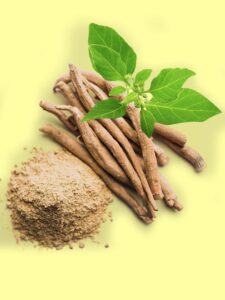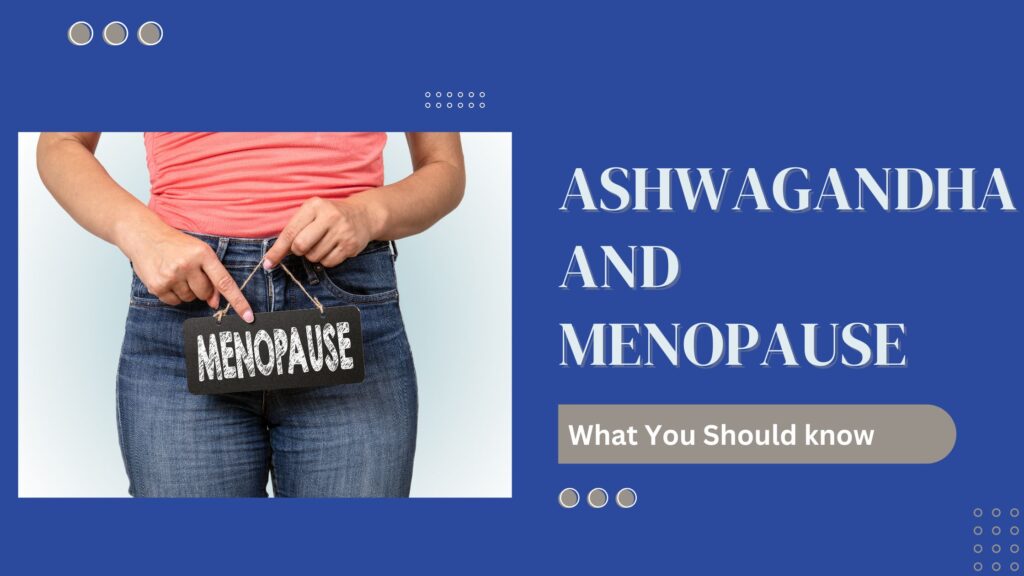Table of Contents
ToggleAre you dealing with the uncomfortable symptoms of menopause and looking for a natural way to regain balance? If so, then you’ve come to the right place! I have been researching how ayurvedic herbs can help alleviate menopausal symptoms for years. Out of all of them, ashwagandha is one of the most powerful. In this article, I will explain what ashwagandha is and the many ways it can provide relief for menopause. Not only that but also give you tips on how to incorporate it into your daily routine to maximize its potential benefits. So if you’re ready to take back control of your health during perimenopause and menopause, let’s get started!
What is Ashwagandha and How Does it Work?

Ashwagandha, also known as Withania somnifera, is a fascinating herb with a long history in Ayurvedic medicine. For centuries, it has been revered for its ability to enhance overall well-being and promote a sense of balance within the body. But what makes ashwagandha particularly valuable for women going through menopause?
The answer lies in its remarkable capacity to regulate hormonal imbalances. Menopause is a natural process that brings about significant changes in hormone levels, often leading to uncomfortable symptoms like hot flashes and mood swings. Ashwagandha steps into the picture as an adaptogen – a substance that helps our bodies adapt to stressors and restore equilibrium.
By acting on the endocrine system, this incredible herb can help stabilize estrogen levels during menopause. Estrogen plays a crucial role in maintaining bone density, cardiovascular health, and even cognitive function. So when these levels fluctuate wildly during menopause, it’s no wonder we experience such drastic changes physically and emotionally.
But Ashwagandha swoops in like an elegant superheroine! Its unique properties work wonders by modulating estrogen activity while simultaneously calming the nervous system – reducing anxiety and promoting restful sleep- all without causing any hormonal disruption or unpleasant side effects.
So ladies,
Let Ashwagandha be your knight in shining armor on this journey through menopause!
– Ease those pesky hot flashes
– Tame those moody moments
– Support your bone health
With ashwagandha by your side,
you’ll find yourself sailing smoothly through this transition phase with grace.
Ditch discomfort & embrace balance!
We have covered an extensive guide on Ashwagandha which includes ashwagandha and viagra together. Further to better understand the herb and its various uses, we have covered topics like ashwagandha and hot flashes which you might be interested in.
Also, check out our recent posts: ashwagandha and perimenopause
Alleviating Hot Flashes and Night Sweats
Hot flashes and night sweats, oh boy! Those pesky symptoms of menopause can really throw a wrench in our daily lives. I mean, who wants to be drenched in sweat during the day or wake up in the middle of the night feeling like they’re in a sauna? Not me!
But fear not, my friends, because Ashwagandha is here to save the day! This incredible herb has been known to regulate estrogen levels in our bodies. And guess what? Estrogen imbalance is often one of the culprits behind those fiery hot flashes and sweaty nights.
By balancing hormones like a boss, ashwagandha helps us sail smoothly through this transition called menopause. It’s like having a personal hormone therapist right at our fingertips! With its magical powers (okay, maybe not literally), it can alleviate those discomforting symptoms that make us feel like we’re constantly on edge.
So picture this: you’re going about your day feeling cool as a cucumber (no pun intended). No more sudden waves of heat washing over you or awkwardly fanning yourself down with anything you can find. And when bedtime rolls around, sweet dreams await – without waking up all clammy and sticky.
Ashwagandha truly is nature’s gift to women experiencing menopause. Say goodbye to those sleepless nights and hello to comfort during the day. It’s time for us ladies to reclaim control over our bodies and embrace this next chapter with grace and ease – thanks to Ashwagandha!
You Might Like: https://realgoodgummies.com/how-to-cycle-ashwagandha
Improving Mood and Reducing Anxiety
Menopause, oh boy! The time when our bodies go through some major changes and wreak havoc on our emotions. One minute we’re feeling fine, the next minute we’re crying over a commercial for cat food. It’s like riding an emotional roller coaster that never seems to end. But fear not, my friends, because there might be a natural solution to help smooth out those mood swings – Ashwagandha!
Now you may be wondering, what in the world is Ashwagandha? Well, it’s an herb that has been used for centuries in Ayurvedic medicine to promote overall well-being. And recent studies have shown that it can do wonders for menopausal moodiness.
One of the reasons why Ashwagandha is so effective is because it helps reduce cortisol levels in our bodies. Cortisol is often called the “stress hormone” and can play a big role in anxiety and depression during menopause. By lowering cortisol levels, Ashwagandha helps us feel more calm and relaxed.
But that’s not all! This amazing herb also increases serotonin production – you know, the happy hormone? Yep, by boosting serotonin levels, Ashwagandha acts as a natural mood enhancer. So instead of feeling down in the dumps or constantly on edge during menopause, you could find yourself feeling more balanced and content.
So ladies (and gentlemen who are interested), if you’re going through menopause or want to support someone who is, consider giving Ashwagandha a try. It might just be your ticket to smoother moods and happier days ahead!
You Might Like: https://realgoodgummies.com/ashwagandha-and-maca-root
Enhancing Energy Levels and Combatting Fatigue
Fatigue during menopause can be a real pain, and finding ways to manage it can feel like an uphill battle. But fear not! There’s a natural solution that might just work wonders for you – Ashwagandha. This ancient herb has been praised for its ability to support adrenal function, which is key when it comes to energy production.
Now, you may be wondering what the heck adrenal function even means. Well, let me break it down for you. Your adrenals are these little glands located on top of your kidneys, and they play a crucial role in regulating your body’s response to stress and producing those much-needed hormones that keep us going throughout the day.
By promoting healthy adrenal function, Ashwagandha helps balance out your energy levels without any of those nasty jitters or crashes that stimulants often bring along with them. It’s like giving your body a gentle boost without overloading it with caffeine or other artificial ingredients.
So how exactly does this magical herb do its thing? Well, Ashwagandha contains compounds called adaptogens that help your body adapt (hence the name!) to stressful situations more effectively. Think of it as giving your adrenals a little pat on the back and saying “Hey buddy, I gotcha covered!”
In conclusion, my weary friends, if fatigue is getting the best of you during menopause, give Ashwagandha a try. It supports healthy adrenal function and provides a natural energy boost without any unpleasant side effects. Say goodbye to exhaustion and hello to renewed vitality!
You Might Like: https://realgoodgummies.com/ashwagandha-withdrawal-things-you-must-know
Boosting Cognitive Function and Memory
Brain Fog and Memory Lapses: The Menopause Struggle
Ladies, let’s talk about a topic that often gets swept under the rug – menopause. Ah, yes, those dreaded hot flashes and mood swings are familiar to many of us. But did you know that fluctuating hormone levels during this stage can also wreak havoc on our memory?
Enter brain fog – the frustrating phenomenon where your mind feels like it’s covered in a thick blanket of haze. You struggle to recall simple things, like where you put your car keys or what you had for breakfast. It’s enough to drive anyone up the wall!
But fear not! There may be an elegant solution hiding in nature’s bounty – Ashwagandha. This magical herb has been praised for its neuroprotective effects on the brain. How does it work? By reducing oxidative stress and inflammation while simultaneously stimulating nerve growth factors.
- This incredible plant has been found to improve cognitive function during menopause.
- It enhances memory retention so that those pesky lapses become less frequent.
- Ashwagandha even helps clear away the mental fog, giving you newfound clarity amidst all that hormonal chaos.
The best part? You don’t need a magic spell or secret potion; just incorporating Ashwagandha into your daily routine could make all the difference. So why not give it a try? Say goodbye to brain fog and reclaim your sharp mind!
You Might Like: https://realgoodgummies.com/ashwagandha-gummies-for-sex
Supporting Bone Health and Preventing Osteoporosis
Estrogen, a hormone produced primarily in the ovaries, is crucial for maintaining bone health. It helps regulate the activity of cells called osteoblasts, which are responsible for building new bone tissue. However, during menopause, when estrogen levels decline significantly, women become more susceptible to developing osteoporosis—a condition characterized by weak and brittle bones.
Luckily, nature has provided us with a potential solution: ashwagandha. This ancient medicinal herb has gained popularity in recent years for its numerous health benefits. Studies have shown that ashwagandha can stimulate osteoblast activity, thereby promoting new bone formation. By incorporating this powerful herb into your daily routine—whether through supplements or as part of your diet—you may be able to support and maintain healthy bone density.
Reducing the risk of fractures is another important aspect of bone health that should not be overlooked. Ashwagandha’s ability to promote strong bones can help prevent fractures from occurring in the first place. Imagine being able to go about your day without constantly worrying about a simple fall leading to a broken bone! By including ashwagandha in your lifestyle choices, you could potentially minimize this concern and embrace an active life with confidence.
In conclusion, estrogen decline during menopause poses significant risks to our bones’ strength and density. Ashwagandha offers hope as an effective natural remedy by stimulating osteoblast activity and supporting overall bone health. So why not take advantage of what nature has provided? Consider adding ashwagandha to your daily routine and give yourself peace of mind knowing you’re actively working towards maintaining strong and healthy bones.
How to Incorporate Ashwagandha into Your Daily Routine
When it comes to incorporating ashwagandha into your daily routine during menopause, there are a few things to keep in mind. Firstly, the herb is available in different forms such as capsules, powders, tinctures, and even as an ingredient in herbal teas. This gives you flexibility in choosing the method that suits you best.
If you’re new to ashwagandha or any herbal supplement for that matter, it’s recommended to start with a low dosage. This allows your body to adjust gradually and ensures that you don’t experience any adverse effects. As time goes on and depending on how your body responds, you can then increase the dosage slowly.
However, it’s important not to self-medicate without consulting a healthcare professional first. They can provide personalized guidance based on your specific needs and medical history. They may also be able to recommend the most suitable form of ashwagandha for you.
Incorporating ashwagandha into your daily routine effectively requires finding what works best for you personally. Whether it’s taking capsules with water in the morning or adding powdered ashwagandha to your smoothie, experimentation is key until you find a method that fits seamlessly into your lifestyle.
Remember that consistency is key when taking any supplement or herb – including ashwagandha during menopause. Stick to a regular schedule and give yourself time to notice its potential benefits before making any adjustments or conclusions about its effectiveness for managing menopausal symptoms.
FAQ
1. What is Ashwagandha and how does it help manage menopause symptoms?
– Ashwagandha is an ancient herb used in Ayurvedic medicine, known for its adaptogenic properties. It helps balance hormone levels, reduce stress, and alleviate common menopause symptoms like hot flashes and mood swings.
2. How should I use Ashwagandha to manage menopause symptoms effectively?
– The recommended dosage of Ashwagandha for managing menopause symptoms is typically 300-500 mg per day. It can be taken in capsule or powder form as a dietary supplement or added to warm beverages like tea.
3. Are there any potential side effects or interactions with medications when using Ashwagandha for menopause relief?
– Generally, Ashwagandha is considered safe for most people when taken within the recommended dosage range. However, if you have underlying health conditions or are taking certain medications, it’s advisable to consult with a healthcare professional before incorporating Ashwagandha into your regimen.
4. How long does it take to experience the benefits of using Ashwagandha for managing menopausal symptoms?
– Results may vary from person to person; however, many individuals start noticing improvements within a few weeks of consistent use. It’s important to maintain regular usage over time to maximize the potential benefits.
5. Can I combine Ashwagandha with other natural remedies or hormone replacement therapy (HRT)?
– While combining different approaches may be possible, it’s always best to consult with a healthcare provider who specializes in integrative medicine or women’s health before combining natural remedies like ashwagandha with HRT or other supplements. They can provide personalized advice based on your specific needs and medical history.
Dr. Susan Francis is a passionate medical professional with over 4.5 years of experience in the field. She received her medical degree from the University of Michigan and completed her residency at the Mayo Clinic.
In addition to her clinical work, Dr. Francis has a strong interest in medical writing and editing. She has edited numerous articles for medical journals and is a regular contributor to several healthcare publications.
Dr. Francis is committed to promoting accurate and accessible medical information to the public. In her free time, she enjoys staying up to date on the latest medical research and volunteering at local healthcare clinics.
- October 3, 2023
- October 3, 2023









